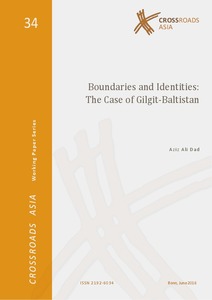Dad, Aziz Ali: Boundaries and Identities: The Case of Gilgit-Baltistan. Bonn: Competence Network Crossroads Asia: Conflict – Migration – Development, 2016. In: Baldauf, Ingeborg; Conermann, Stephan; Kreutzmann, Hermann; Nadjmabadi, Shahnaz; Reetz, Dietrich; Schetter, Conrad; Sökefeld, Martin; Bech Hansen, Claus Erik; Hornidge, Anna-Katharina; Mielke, Katja; Nokkala, Nelli (Hrsg.): Crossroads Asia Working Paper Series, 34.
Online-Ausgabe in bonndoc: https://hdl.handle.net/20.500.11811/169
Online-Ausgabe in bonndoc: https://hdl.handle.net/20.500.11811/169
@techreport{handle:20.500.11811/169,
author = {{Aziz Ali Dad}},
editor = {{Ingeborg Baldauf} and {Stephan Conermann} and {Hermann Kreutzmann} and {Shahnaz Nadjmabadi} and {Dietrich Reetz} and {Conrad Schetter} and {Martin Sökefeld} and {Claus Erik Bech Hansen} and {Anna-Katharina Hornidge} and {Katja Mielke} and {Nelli Nokkala}},
title = {Boundaries and Identities: The Case of Gilgit-Baltistan},
publisher = {Competence Network Crossroads Asia: Conflict – Migration – Development},
year = 2016,
month = jun,
series = {Crossroads Asia Working Paper Series},
volume = 34,
note = {The main argument of the paper is that the absence of Gilgit-Baltistan in the power dispensation and state structure of Pakistan has created a power vacuum in the society, which is gradually filled by sectarian forces, nationalist movements, ethnic movements and regional associations. These actors attempt to rearticulate identities in Gilgit-Baltistan with direct repercussions for the region’s association to the Kashmir dispute. The ways in which these identities are rearticulated reject the official narratives of the state and Kashmiri nationalism. Thus, Gilgit-Baltistan’s path is diverging after having shared a history with Kashmir during the colonial period. Under the new political dispensation in the post-colonial period, it has become subservient to the Kashmir dispute. This paper examines processes of identity articulation by religious, nationalist and ethnic groups that show the drifting of the region away from Kashmir. Although the region has been kept in a constitutional limbo by Pakistan due to the Kashmir dispute, the changes brought about by broader regional developments and increased communication have triggered political, economic and cultural processes that exceed the received narratives posited by the state and Kashmiri nationalism. The emergence of new local identity narratives has social and political ramifications because it compels certain sectarian quarters and nationalists to rethink their views about the identity of Gilgit-Baltistan vis-à-vis Kashmir on the one hand, and expunge the Kashmir question from the identity formation among ethnic and regional groups on the other hand. Similarly, the paper considers mutations in the notion of identity in tandem with vicissitudes of history and thereby treats identity in the modern period as fragmented and fractured under the influences of forces that are indigenous and exogenous to the region. While exploring the processes of reformulation of identities in Gilgit-Baltistan, the paper identifies emerging contours of new identities among different segments of society in a fluid transformation.},
url = {https://hdl.handle.net/20.500.11811/169}
}
author = {{Aziz Ali Dad}},
editor = {{Ingeborg Baldauf} and {Stephan Conermann} and {Hermann Kreutzmann} and {Shahnaz Nadjmabadi} and {Dietrich Reetz} and {Conrad Schetter} and {Martin Sökefeld} and {Claus Erik Bech Hansen} and {Anna-Katharina Hornidge} and {Katja Mielke} and {Nelli Nokkala}},
title = {Boundaries and Identities: The Case of Gilgit-Baltistan},
publisher = {Competence Network Crossroads Asia: Conflict – Migration – Development},
year = 2016,
month = jun,
series = {Crossroads Asia Working Paper Series},
volume = 34,
note = {The main argument of the paper is that the absence of Gilgit-Baltistan in the power dispensation and state structure of Pakistan has created a power vacuum in the society, which is gradually filled by sectarian forces, nationalist movements, ethnic movements and regional associations. These actors attempt to rearticulate identities in Gilgit-Baltistan with direct repercussions for the region’s association to the Kashmir dispute. The ways in which these identities are rearticulated reject the official narratives of the state and Kashmiri nationalism. Thus, Gilgit-Baltistan’s path is diverging after having shared a history with Kashmir during the colonial period. Under the new political dispensation in the post-colonial period, it has become subservient to the Kashmir dispute. This paper examines processes of identity articulation by religious, nationalist and ethnic groups that show the drifting of the region away from Kashmir. Although the region has been kept in a constitutional limbo by Pakistan due to the Kashmir dispute, the changes brought about by broader regional developments and increased communication have triggered political, economic and cultural processes that exceed the received narratives posited by the state and Kashmiri nationalism. The emergence of new local identity narratives has social and political ramifications because it compels certain sectarian quarters and nationalists to rethink their views about the identity of Gilgit-Baltistan vis-à-vis Kashmir on the one hand, and expunge the Kashmir question from the identity formation among ethnic and regional groups on the other hand. Similarly, the paper considers mutations in the notion of identity in tandem with vicissitudes of history and thereby treats identity in the modern period as fragmented and fractured under the influences of forces that are indigenous and exogenous to the region. While exploring the processes of reformulation of identities in Gilgit-Baltistan, the paper identifies emerging contours of new identities among different segments of society in a fluid transformation.},
url = {https://hdl.handle.net/20.500.11811/169}
}






